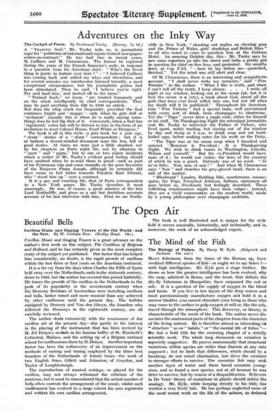Adventures on the Inky Way The Cockpit of Peace. By
Ferdinand Tuohy. .(Murray. 7s. 6c1z) A "TRAINED Seal," Mr. Tuohy tells us, is journalistic argot for" politician-of-internaflonal-repute;turried-newspaper- writer-on-contract." He has had two in recent years, M. Caillaux and M. Clemenceau. The former he captured during the years of the. -French financier's exile,- in response to a question from his American chief : "Who's the livest
thing in Pants to feature over here ? I believed Caillaux was coming back and added my Whys and wherefores, and for several minutes my interlocutor listened intently, a most exceptional cirmunstance, but his journalistic genius had been stimulated. Then he said, 'I believe you're right. Try and land him,' and dashed off to the races." " Trained Seals," we learn, "are treated humanely and on the whole .intelligently by chief correspondents: They
May be paid anything from £20. to 2100 an article. . . 'Nor does the whip -erack too frequently; provided the Seal continues bright and 'snappy '—only when he gets dull or 'technical ' (usually this is when he is really saying some- thing) does he feel the flick of it. Conversely, when a Seal has registered,' extra fish will be thrown to him in the form of an invitation to meet Colonel House, Pearl White or Dempsey."
• The book is all in this style--a jazz book for a jazz age,
stunt" stories of a " stunt " correspondent ; but it is at bottom a decent-minded document none the less, full of good stories. At times we were just a little shocked, not by the chapters on Paris night life, nor by allusions to " Snow " and "pipes," but to One or two minor incidents which a writer of Mr. Tuohy's evident good feeling slibuld have omitted when he re-read them in proof—such as part of-his Pyrrenean trip and some remarks on the poor favourite of the Emperor Franz Joseph, although he certainly did have cause to feel bitter towards Fra.ulein Kati Schratt, who "stood him up" over a contract.
It is a gay and exacting life, that of Paris correspondent to a New York paper. Mr. Tuohy describes it most amusingly. He was, of course, a great admirer of the late Lord Northcliffe, and gives us a sad but doubtless accurate account of his last interview with him. First we see North-
cliffe in New York, "shooting out replies on chewing gum and the Prince of Wales, girls' stockings and British films" to all who cared to come to question' bini at the Gotham 'Hotel. An amazing Delphic day; this : Mr. Tuohy says he saw some reporter's go into the street and bribe a -pretty girl to question his chief on-free love, and protested. Six months later, at Cap d'Ail, "—,here he lay before me—quenched, finished." Yet the mind was still alert and clear.
Of M. Clemenceau, there is an interesting and sympathetic account. "I shall never write my memoirs," said Pere Vietoire " to the author. "-What I like is truth, -and when I can't tell all the truth, I keep silence. . . . I write all night at my window' looking out at the ocean (ah, but it is best the ocean :n a fury), a book about God, about- all the gods that have ever lived rolled into one, but not till after my death will it be published." Throughout -his American tour "Pere Vietoire ' had a special train, well provisioned with every, sort of drink, from champagne to chartreuse. Yet the Tiger" never drew a single cork, either for himself or his staff. On Thanksgiving Night the attendant journalists sent Mr. Tuohy to interview the Father of Victory, Who lived apart, rarely reading, but staring -out of the window by day and rising at 3 a.m. to drink soup and eat hard boiled eggs, before making notes for his work on the Deity.
"The Tiger was at his onion soup when I -knocked and entered. 'Monsieur le President : It is Thanksgiving Night. We wish to drink toasts to Washington, Lincoln, Wilson and yourself.'" But the ex-President would have none of it ; he would not violae_t the laws of the country of which he was a guest. Entreaty was of no avail. " Je m'zn fiche. Non, non, et non ! " And when M. Clemenceau says " Non " and clenches his grey-gloved hand, there is an end of the matter.
" Bluebeard " Landru, Battling Siki, murderesses, manne- quins, the Pope, Pussyfoot Johnson, Sultans, statesmen all pass before us, frivolously but feelingly described. These rollicking reminiscences might have been vulgar : instead, they are a vivid commentary on the modern world, made by a young philosopher over champagne cocktails.






















































 Previous page
Previous page